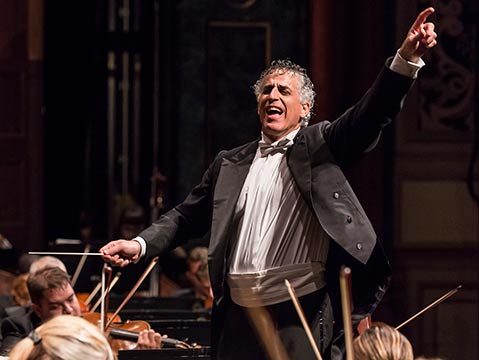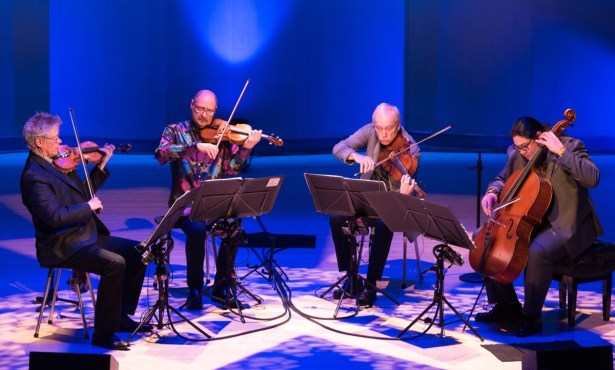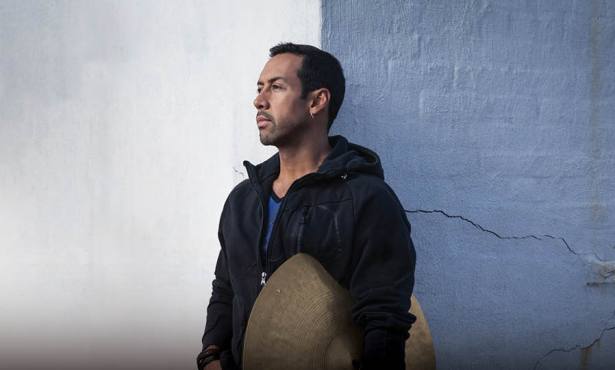S.B. Symphony Premieres Double Concerto
Carrara’s ‘Machpelah’ Puts Violin and Cello in Dialogue

Here on the American Riviera, we try not to miss any chance to point out similarities between our culture and that of the great civilizations of the Mediterranean. Most of the time this means talking about climate, architecture, or food — all of them of course very worthy subjects. But an interesting thing is happening to Santa Barbara’s musical culture right under our Riviera noses, and it is happening primarily as a result of the decade that Maestro Nir Kabaretti has now put in as artistic director of the Santa Barbara Symphony. Kabaretti’s professional journey, which brought him to Santa Barbara by way of the great concert halls of Europe, began in Israel and in Italy, and he continues to participate actively in the rich musical cultures of both those places.
As a result, this Saturday and Sunday, Santa Barbara’s Granada Theatre will become, for a weekend at least, the center of the world for contemporary Italian classical music, as that country’s foremost young composer, Cristian Carrara, will be here to attend the world premiere of his latest composition, Machpelah: Dialogue for Violin, Cello, and Orchestra. Carrara’s double concerto is named for the Cave of the Patriarchs, a site in the old city of Hebron on Israel’s West Bank that contains the tombs of three couples from the early chapters of Genesis: Abraham and Sarah, Isaac and Rebecca, and Jacob and Leah. In this musical dialogue about love, the parts of the man and the woman are played by the soloists, who just happen to be a man and a woman — the rising star, Italian violinist Francesca Dego, and the principal cellist of the Los Angeles Philharmonic, Robert deMaine.
No modern work named for a sacred site located on the West Bank would be complete if it professed to be innocent of politics. Carrara’s explicitly is not. He intends this musical conversation as an analogy and even perhaps an example of what real discussion can achieve or, in his words, that “love can defeat fear.” That’s a message that can’t be heard often enough when talking about Israel and the current situation on the West Bank.
The entire program, which also includes an Italian baroque brass fanfare by Giovanni Gabrieli, Handel’s Water Music, and Béla Bartók’s scintillating Concerto for Orchestra, centers on this theme of dialogue, thus setting Carrara’s new work in a creative lineage of great music aimed at promoting communication and understanding.
When I spoke with violin soloist Dego by phone from Italy last week, among the first things I discovered, by way of her flawless American-accented English, was that she is herself a result of an intercultural exchange of love, as her mother is American and her father is Italian. Dego recently released the final volume of a complete set of all the Beethoven violin sonatas with pianist Francesca Leonardi on the ultra-prestigious Deutsche Grammophon label. She told me that Carrara’s Machpelah is “definitely about dialogue” and that it “also has a religious side. There are many places in which one can hear the influence of Jewish and Arabic styles of music, and often to the point where it can be hard to tell them apart.” Dego admires Carrara’s earlier work and describes his approach as “contemporary but without clashes. He’s not at all like Brahms, and only superficially like Saint-Saëns [other composers of double concertos]. It’s funny, but to me he sounds almost American.” And so the cultural dialogue continues, with love, and from Italy.
4.1.1
The Santa Barbara Symphony will perform Saturday, January 16, at 8 p.m. and Sunday, January 17, at 3 p.m. at the Granada Theatre (1214 State St.). For tickets and information, see granadasb.org or call the box office at 899-2222.



